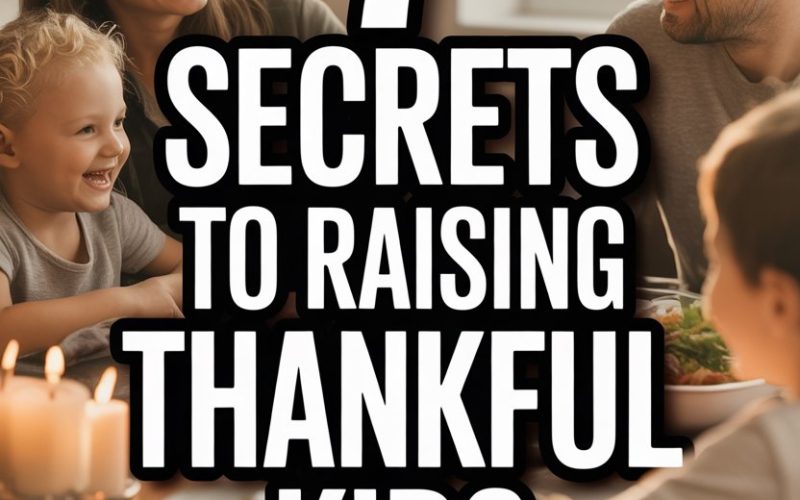Ever feel like your children believe gratitude is an ancient myth, like handwritten letters or dial-up internet? You’re not alone.
Most parents have found themselves staring at their offspring’s mountain of toys, wondering if “thank you” has been quietly exiled from the family vocabulary.
Cultivating gratefulness in kids—especially when you’re already juggling a thousand things—can seem mythical in itself.
Good news: it’s entirely possible, and it doesn’t require moving to a remote island with no Wi-Fi. Here’s how.
1. Show Gratitude Out Loud (Even If It’s Just for Coffee)
If you want to raise kids who say thank you, they need to see you saying it first—and not just when Nana delivers her annual pile of knitted socks.
Express thanks for small things in your own life, like your partner making tea, the dog not eating someone’s shoe (again), or the postie delivering parcels in the pouring rain.
Research from the Greater Good Science Center at UC Berkeley confirms that kids pick up most social habits through observation. If you’re grousing about everything, they’ll become professional grouchers too.
Narrate your gratitude, even if it feels a tad theatrical. “Wow, I love the way you put your bowl in the sink!” Simple, sincere, and effective.
2. Make Giving Thanks Part of Your Family Routine
Gratitude should be as everyday as brushing teeth or mysteriously losing socks. Weave thankfulness into your daily rituals. It could be sharing one thing you’re grateful for at dinner, on the school run, or during bedtime stories.
Some families keep a “gratitude jar,” tossing in notes about good things, no matter how minor—“Mum didn’t burn the toast!” Not only does this cement the language of gratitude, but it also helps kids spot positives in their day, not just the negatives.
And when the jar’s full, it doubles as a half-decent doorstop.
3. Let Kids Earn It (Yes, Even the Good Stuff)
Children who are handed every new gadget or treat before they’ve even finished asking rarely learn to appreciate it. Waiting, saving, and working for something gives kids real skin in the game.
That new scooter isn’t just an object—it’s a trophy earned with patience or chores or both (and possibly a few moans along the way).
A study in the Journal of Positive Psychology found that effort breeds gratitude. When kids earn their privileges or goodies, they’re more likely to value them—and thank the gift-giver, too.
This doesn’t mean transforming your home into a Dickensian workhouse. But small responsibilities and rewards can work wonders.
4. Talk About the World (No Guilt-Tripping Required)
No one wants to raise a child who’s only thankful because they’ve been told there are “children starving elsewhere.” But kids do benefit from learning about different experiences and realities, ideally without the guilt-trip soundtrack.
Read stories, watch age-appropriate news clips, or talk about what life looks like in other communities or countries. You might even link up with a family charity, so your children can see firsthand how their actions matter.
The Charity Commission for England and Wales has some advice for families looking to get involved. The point isn’t to make your kids feel bad, but to broaden their horizons (and maybe stop them from whining when the Wi-Fi blips).
5. Don’t Rescue Them from All Disappointment
It’s tempting to swoop in and fix every problem. But disappointment is the soil where gratitude can grow.
Missed out on a birthday party? Forgotten their school lunch? As long as the problem isn’t catastrophic, let them feel the sting.
When kids realise they can’t always have what they want, they’re more likely to notice—and appreciate—when things do go their way.
Psychologists call it “frustration tolerance,” and it’s linked to greater emotional resilience (see this piece from Psychology Today). Hard to watch? Absolutely. Worth it? You bet.
6. Coach the Thank-You (Without Turning into a Drill Sergeant)
Sometimes, kids honestly forget to say thank you. Much as it pains us, it’s usually not a sign of deep-seated entitlement—just classic kid brain.
A gentle nudge, a whispered reminder (“What do you say to Gran?”), or practicing together before social situations can help.
Role-playing is your friend here. Stage a “thank you” rehearsal with stuffed animals. Switch up the script. Make it silly.
If your child is especially shy, give them phrases or gestures they can use, like a high-five or a homemade card.
It’s less about barking orders, more about helping them develop the habit, until it becomes second nature (like their uncanny ability to remember every lyric to Baby Shark).
7. Celebrate Generosity (Big and Small)
Acts of giving—whether it’s sharing biscuits at school, donating old toys, or writing a thank-you note—should get a mention. Not trophies or medals, but a bit of genuine attention. “I saw the way you helped your brother find his shoes. That was kind.”
Kids thrive on positive feedback and these moments are golden opportunities for teaching gratitude. According to the Child Mind Institute, recognising kind acts reinforces the value of generosity and encourages more of it.
You might even spark a family “kindness challenge”—just don’t be shocked when someone tries to out-nice their siblings for extra brownie points.
When You’re Tired, and They’re Thankless
Gratitude isn’t baked in overnight. Some days, you’ll wonder if anything is sinking in. You might even catch yourself fantasising about installing a gratitude app directly into your child’s brain (if only, right?).
Here’s the thing: every small effort counts. Even if your kids roll their eyes or mumble thanks through a mouthful of chips, you’re planting seeds.
One day, you’ll overhear your child thanking the dog for not chewing their trainers, or witness them beam when someone notices their own thank-you note. And you’ll know you’re on the right track.
Raising thankful kids isn’t about perfection—or raising mini monks. It’s about giving your children the language and practice of gratitude, so it feels as natural as breathing.
Or at least as natural as leaving dirty socks in the hallway.
Now, if only gratitude could do the laundry too.




